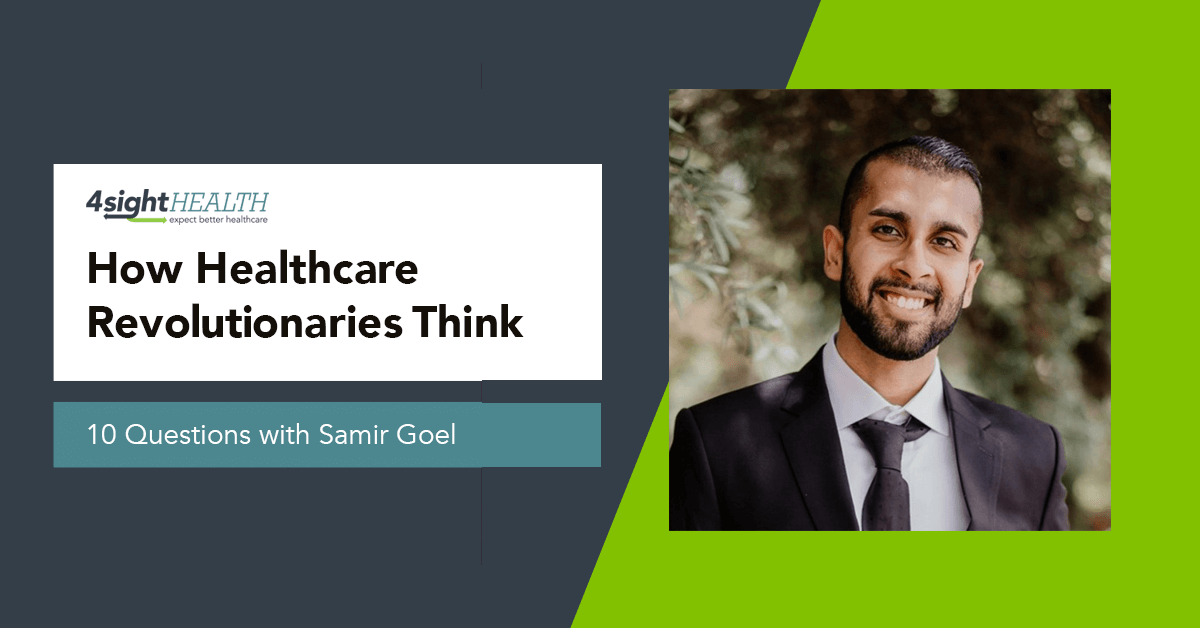October 24, 2023

How Healthcare Revolutionaries Think: 10 Questions with Samir Goel
Welcome to the latest installment of 4sight Health’s series, How Healthcare Revolutionaries Think. Our interview series profiles healthcare instigators who believe that outcomes matter, customers count and value rules.
If you asked me to make a list of the top 20 things that would lead to better health for individuals and better overall health for patient populations, a good credit score would not be on my list. A good credit score may not even make my top 100.
But that’s the connection Samir Goel is making with his company Esusu. Goel co-founded Esusu in 2018 with business partner Wemimo Abbey. Based in New York, Esusu collects and reports rent payments by consumers to credit agencies to help boost renters’ credit scores.
First, who knew that religiously paying your rent each month historically didn’t count toward your credit score? I didn’t. Second, I never connected a good credit score with good health because I’ve been lucky enough financially not to worry about my credit score and not worry about accessing medical care. I live in such a bubble sometimes.
Goel doesn’t and hasn’t since his family emigrated to the U.S. from India right before he was born. He knows firsthand that economic stability is a social determinant of health, and that a good credit score is the key to economic stability.
Goel explained it all to me in a wide-ranging discussion. You can also listen to a podcast interview with Goel on his personal experiences with the healthcare system and how thrilled his parents are over his risk-taking, entrepreneurial spirit.
1. Samir, let’s start with the question we ask everyone, and that’s for your definition of a healthcare revolutionary. What do you think?
Goel: A healthcare revolutionary is someone who is not willing to accept the status quo. All they think about is how they can change the system for the benefit of people. In this case, the healthcare system.
More broadly, though, when I think of a revolutionary, I think of someone who’s thinking of system-level change. How do we take a system that leaves people behind and change it into one in which everyone is able to work within and be successful within? That’s different from helping people who the current system leaves behind.
A lot of the interventive work today is really focused on helping people who are left behind by a broken system and helping those people get back on their feet. A revolutionary is thinking about how we can reconstruct the system so that no one gets left behind in the first place.
2. Is there a healthcare revolutionary or revolutionary in general, past or present, who inspires you?
Goel: Absolutely. There are so many people that I look up to and aspire to be like. One is Jeff Wiener, a co-founder and former CEO of LinkedIn. I have a lot of admiration for Jeff because he’s a leader who has been able to build a purpose-driven company and scale it. He created an opportunity for every member of the global workforce and built it into something that can stand the test of time.
In a similar vein is Reid Hoffman, another LinkedIn co-founder and former executive chairman. He’s always noodling on how to shift the world in the right direction. He does that through the public sector by being politically active and by founding and supporting various philanthropic organizations.
I started my career working in the public sector. I’ve always found inspiration in politics and policy. The other half of my brain is all business and technology. When you put the two together, there’s a lot you can learn from all kinds of different people.
3. When you think about the two halves of your brain — politics/policy and business/technology — are they complementary or do they battle each other sometimes?
Goel: I think they’re complementary. When you can bring those two together, that’s where the magic happens. If you understand how nonprofits work, you understand how business works, you understand how government works, and you can find ways to bring them together. There’s magic to be made in terms of systems change.
I’ve worked in all those areas, and I feel like every one of those sectors tends to dismiss the others. If you’re in government, you think all these cold-blooded capitalists don’t really want to do X, Y or Z. If you’re in business, you think the government is too slow and bureaucratic and can’t get anything done. Nonprofits have the same mindset about both business and government.
But, actually, they all have their part to play. We’ve had a lot of success in bringing those various sectors together for the purpose of a shared mission.
4. Do you think you’re a healthcare revolutionary or a revolutionary generally?
Goel: It feels narcissistic to define myself as a revolutionary. That aside, we are fundamentally focused on changing the status quo. We’re trying to dismantle barriers to housing for all families. When I think about things like credit or the financial system, they treat you like you’re guilty until proven innocent. Our vision is to unleash the power of data to bridge the racial wealth gap. That requires thinking about how systems that exist today can be different. So, by that standard, I think that the work we’re doing falls into that revolutionary category.
5. Economic stability is a social determinant of health, according to the Department of Health and Human Services (HHS). When did you first hear about social determinants of health? And what was your reaction?
Goel: Intuitively, I understood social determinants of health before I learned the academic name for them about a decade ago. They made sense to me because I saw it firsthand. Part of the inspiration for creating Esusu was my family’s journey emigrating from India to the U.S. and the challenges we faced with financial access and inclusion.
I saw firsthand how these things come together and can affect your health. I really got to see it firsthand through the world of housing. When you see where people live, you see all those social determinants at play. You see the economics. You see the education. You see the food. You see the transportation. You name it. All that is really centered around where people live. You see it so vividly, so tangibly right there in the neighborhood.
6. Connect the dots for me between economic stability and health. Is it as simple as moving to a better neighborhood or being able to buy healthier food?
Goel: Food is a big part of it. If you’re not in an economically stable neighborhood, that means you’re purchasing lower quality foods with more high-fructose corn syrup, more sugar. Historically, weight — even obesity — was considered a product of luxury where kings and queens would have the luxury of being overweight. Now weight and obesity are derivative of poverty because the quality of food and quality of ingredients in the food are not what they should be.
Beyond that, good healthcare and good health are preventative rather than reactive. If you don’t have the financial resources, you’re not going to be preventative. You’re going to take care of something only when you need to take care of it. You’re detecting cancer on day one through a screening or you’re detecting cancer when you’re Stage IV. It’s an extreme example, but that’s the mindset.
Or there aren’t any doctors or other providers near you, and you don’t have the financial resources or time to take off work to drive to see someone miles away. You’re not going to get your regular checkups done. On the flip side, if you have the financial resources, you’re buying high-quality food. You have the capability to go to a doctor regularly. You’re investing in exercise equipment. You’re doing preventative checkups. People living paycheck to paycheck in public housing aren’t doing that.
7. Now connect the dots for me between good credit scores by counting rent payments to economic stability and, by extension, better health.
Goel: That’s a great question. We think of your credit score as your financial identity and as the building block of economic access. If you don’t have a good credit score, you’re not going to qualify for financial products. You’re not going to qualify for jobs. You’re not going to qualify for apartments. You have a lot less opportunity. That’s why we’re so focused on credit. There are about 45 million Americans who are credit-invisible or credit-thin, which means they don’t really have a financial identity.
If we can help people build and establish their credit, things change. One is they’re going to stop paying as much for every single financial product they have. Insurance is going to be cheaper. Credit cards are going to be cheaper. Educational loans are going to be cheaper. Car loans are going to be cheaper.
Interestingly, one of the first things we see on our platform when people build and establish credit is to get a car loan and buy a car. That car represents economic mobility. They can drive to a better job. They can see a doctor or healthcare practitioner in another area. They can bring their children to a better school district. But they needed the credit to qualify for a car loan with affordable interest. That’s why we think that a good credit score is such a quintessential piece of economic stability and, by extension, health.
8. I’ve never met anyone so passionate about credit scores. That’s because I’ve been fortunate enough not to have an issue with mine over the years. Where there’s passion there’s usually personal experience. What’s yours?
Goel: My mom and dad moved to the United States when my mom was pregnant. I was conceived in India and born in the US. When we moved here, we honestly thought we had it made, right? India has 1.4 billion people. It’s hard to be successful. By comparison, America has much more opportunity. But, unfortunately, we had a pretty rude awakening to the U.S. My dad was mugged on his first day here.
Much of my upbringing was watching my parents without a credit score and with limited savings trying to figure out how to make it work both economically and culturally. You could tell the differences between our family and other families who lived on the same street by what their kids were eating for lunch and what I was eating for lunch. They were eating Lunchables, and I was eating rice and peas. As a kid, you just want to assimilate. I was like, “I want what all the other kids are having.” And my parents are like, “No, you’re going to eat your rice and peas.” In hindsight, the rice and peas were better for me frankly than the Lunchables.
Fortunately, my parents worked some miracles to get good jobs, worked hard and built a life here in America over time. But those early years were incredibly challenging for our family.
Similarly, my co-founder, Wemimo Abbey, and his mom emigrated here from Nigeria and promptly took out a 400% payday loan to make ends meet initially. Our experiences brought us together.
9. Speaking of jobs, you’re a licensed real estate agent. I don’t know if that’s for residential real estate or commercial real estate. What lessons did you learn from that experience that you apply to Esusu or how you think about healthcare?
Goel: I never practiced real estate. It was a backup plan. I became a licensed real estate agent after we launched Esusu. That was early days when I was more of a starving artist than a successful entrepreneur. I was like, “If Esusu doesn’t work out, I’ve got a lot of debt. I’m going to be sent to collections by every single organization I’m involved in. I can sell a couple of properties in New York and get back on my feet.”
Thankfully, I never had to use that backup plan. But it did help me learn and understand the real estate industry vernacular. My background was never in housing or real estate. I was able to pick up the lingo. That helped me connect with more people. And it accelerated my learning curve in being familiar with that side of what we’re doing at Esusu.
10. Why Esusu? I looked it up on the internet, and it said Esusu is Nigerian for “savings club.” And we know that the internet is never wrong. Is that right? And why not something more generic like “credit score rent payments” or something more searchable by keywords on the internet?
Goel: Esusu has multiple definitions. One of them is “savings club.” It means savings club in Nigeria or West Africa. When we started the company, we were a savings business. We were building a digitization of rotational savings. That’s quite common in Nigeria. It’s also quite common in India, Latin America and Asia. People group their money together and take turns drawing from the group pot but all informally. Our initial product was taking that concept and digitizing it for immigrant communities in the US.
The second reason for the name is that it’s actually a Yoruba term that means, “If you want to go fast, go alone. But if you want to go far, go together because all of our futures are inextricably tied together.” That’s just very much a part of our ethos. At Esusu, one of our core values is called, “Forward together.” That’s always the way we’ve thought about systems change as well. How do we bring everyone in as part of the journey?
We didn’t do this purposefully, but the name also turned out to be a great conversation starter. People are always curious about it, and that gets them engaged with what we’re doing.
Burda’s Final Bit
Samir Goel is a living example of why the future of the United States will depend on people emigrating here from other countries. They, more than many third- and fourth-generation Americans, are willing to take the risks, willing to do the tough jobs and willing to work hard to make themselves and our country successful. In this case, Goel and Esusu are helping underserved and immigrant populations in the U.S. become full-fledged and active members of our economy by virtue of improving their credit scores. That transition from economic burden to economic asset also improves their health status and reduces their costly and unnecessary use of the U.S. healthcare system. Now that’s revolutionary healthcare thinking.
Esusu’s mission is to dismantle barriers to housing for working families. The company offers capture, transformation, and reporting of rental payment data into the credit bureaus. Tenants can build and establish credit while landlords can drive on-time payments, increase tenant retention and gain unique insights into their portfolios.
Samir Goel is a two-time entrepreneur focused on bridging the access gap. Through Esusu he’s working to unleash the power of data to bridge the racial wealth gap.
Read more Healthcare Revolutionary interviews:
- September 2023: Marcus Whitney
- June 2023: Demi Radeva
- May 2023: Michael Pitt, M.D.
- April 2023: Rebeckah Orton
- February 2023: Dan Trigub
- January 2023: Melina Davis
- December 2022: Bruce Brandes
- November 2022: Lena Chaihorsky
- Read them all here.





